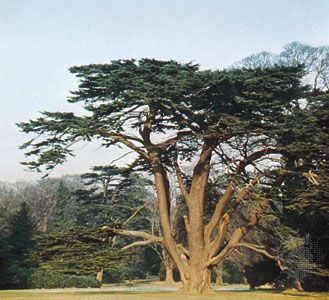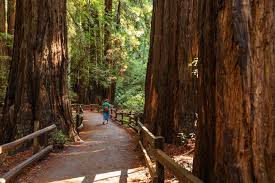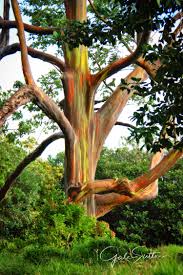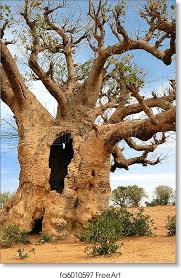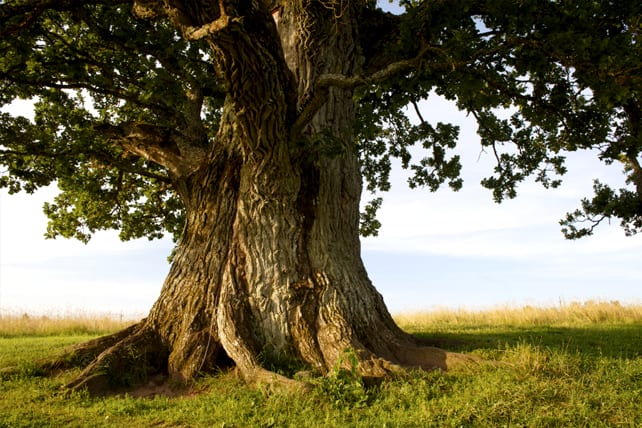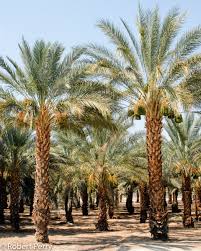I hope, by reading this article you will make certain you are anchored into the Tree of Life, into Jesus Christ. Then I hope you'll find deeper insights by considering the symbols that are common in the Bible. In this three part study the theme is "trees."
Each man is a TREE designed to be connected to Jesus--and through Jesus, connected to the Tree of Life. Not everyone you know has a connection with Jesus yet, whether secret or obvious. Most of us hope our relatives and friends will be all in heaven but for some stubborn old cranks, clods and weirdos we've met, God only knows. Woe to the man, or woman or child who ignores the source of all life. Jesus is a PERSON not a Life-force.
Single men and women with no natural progeny are often lonely and feel that their lives are wasted. Isaiah tells us who remain single that our usefulness to God and unencumbered availability to serve Him can grant us a higher reward than most married men and women are given! A single man or woman who trusts fully in Jesus will not be a dry tree.
Isaiah spoke of Israel as a great tree which had been chopped down but which would regrow because the holy seed, Messiah, was in its stump. Isaiah poured himself into teaching in Israel with no visible fruit to show for his labors. In fact he was martyred during the reign of Manasseh (according to tradition)--by being sawn into inside a hollow log.
Some "trees" found in the Bible are not about individual men. Not all men are good. The Nephilim, the giants of Genesis 6 were not good men. The Second Tree in the Garden of Eden, the Tree of the Knowledge of Good and Evil is not a safe tree. See The Anguish of Adam.
I want to stress again that these seven parables are all part of one message. Our Lord interpreted the first two for us as a guide to our own interpretation of the rest. He gave us a start and he expects us to continue in the same direction. It is clear from the first two that every element in the story has significance. Each is symbolic of some factor or movement in history. As he unfolded the meanings to us we saw what the seed meant, what the sowing was, what the soils were, what the wheat and tares stood for, and who the reapers were. All of these became clear as he interpreted them. This is the first parable of the series which does not have an interpretation from our Lord's lips. So he expects us, obviously, to go on applying the same principles he gave in the first two, and to understand the others from the symbols he employed there, as well as from other symbols in Scripture.
This is one of the basic laws in reading the Bible. Scripture never uses a symbol in two conflicting ways; it uses them consistently throughout. This is very important for you to know. Learn how Scripture uses a symbol and then employ it the same way wherever it appears. Then you will come out with a clear understanding of what the Scripture is teaching. We must do that here.
Men have wasted their lives trying to accomplish what they call "bringing in the kingdom" by a false interpretation of this very parable and of the one that follows it, the parable of the leaven. They have misjudged the whole movement of history because, by a mistaken use of the symbols that he employs, they have misunderstood what our Lord is saying. So it is important that we view each parable here in its context and allow the Lord's interpretation to guide us.
In this parable you will notice that five symbols are used. There is the sower again, and the field in which he sowed, and the seed that is sown which in this case is mustard seed, and there is the tree which grows from it, and the birds that make their nests in its branches. As with the other parables Jesus intends that we understand what these symbols mean in terms of what has been happening in the world since that day. So we will look at it with that in mind.
It is easy to interpret the first two symbols. The sower obviously is our Lord himself. In each of these parables he has been sowing, and in the second parable he told us, "The sower is the Son of man." He sowed in the field, i.e., planted something in the world, because, again as we learned in the second parable, the field is the world, society, the whole of mankind.
What Jesus planted was a seed, in this case a mustard seed. This is the third sowing which occurs in these parables, and each one is of a different seed. The use of these various seeds is our Lord's way of indicating various aspects of the great message which he turned loose in the world. He sowed a fantastic, revolutionary, radical word in human society. In one case it is like wheat which, if received in good soil, will grow up to a true harvest. In another case it is actually people, "the sons of the kingdom." It is an incarnation, the Word become flesh, and these people are placed here and there throughout the world, wherever the Lord wants them. We saw that in our last study together. But in this case it is like a mustard seed. Why mustard seed?
Our Lord employed here a symbol which he expected these people to understand. And if we can put ourselves back in their place, we will not have any trouble either. Mustard is a peculiar kind of seed. It has an unusual quality and this is what our Lord wanted them to catch. What do you think was the first thing these disciples thought of when they heard this symbol employed? I think it was very much like what we would think. Mustard has the quality of pungency. It is biting, irritating, disturbing, and this is what our Lord means.
When I was a boy growing up in Montana we lived in a little town forty-two miles from the nearest doctor. We didn't have any electricity or any plumbing; we were quite happy without all the modern conveniences. But when we got sick we couldn't call for a doctor. There wasn't even a drugstore in town. We had to rely upon what we called "home remedies." We had a book that contained all the remedies for any illness we might contract. If you got a cough or pneumonia or chest congestion there was a standard remedy to apply. We used what we called a "mustard plaster." It is a gooey mixture of mustard and water smeared on a cloth and then placed right on the chest. After it has been there about five minutes you can feel it begin to burn and you start itching and squirming. The contest is to see which will wear out first, the mustard plaster or you. You are supposed to hold it on there until you get just as red as a berry. I don't think it ever cured anything, but it made you forget what was wrong!
That quality of mustard was well known from the very earliest times. It was known to be an irritant, something fiery and biting, stirring up the blood. When Darius, the king of the Persians, invaded Europe with a great army he was met by Alexander the Great. Darius sent Alexander a bag of sesame seed as a kind of taunt, indicating by the number of these small seeds the vast multitude of soldiers he had at his command. When Alexander received it he sent back by the same messenger a bag of mustard seed by way of saying, "You may be many, but we're tough and biting and pungent. We can handle you." And they did.
That is the character of mustard and these people knew that. So our Lord is using a very apt symbol by which he indicates that the message of the kingdom of God is intended to be arousing, irritating, disturbing, among men. Turn it loose, and it will get a whole community excited, stirred up, either negatively or positively, as we see it working so beautifully today.
I have been watching with great interest a church in a city not far from here. This church had for all its history, some seventy years or more, been liberally oriented. It had never taught the Bible, never believed in the supernatural. They had never understood the great gospel message. They had been concerned with social problems, and moral standards, and that sort of thing, but had never known anything of the power of God. But a year or so ago, through an unusual chain of circumstances, the pastor became a real Christian and he started preaching the gospel. It is most interesting to watch what is happening in the congregation. He is making a lot of people uncomfortable. They are beginning to squirm and itch -- you can see the mustard working on them. Others are being healed and rejoicing in it. The pastor is doing a very gracious, loving job of proclaiming this great message, but its quality is obvious -- it is pungent and biting and burning.
Our Lord calls particular attention to another property of mustard. It has, he says, the smallest of all seeds. If you have seen a mustard seed you know that it is small but obviously it is not the smallest of all seeds. There are seeds smaller than mustard seeds. There were even in Palestine in our Lord's day. Many have been disturbed by this, as though it means that our Lord did not understand much about agriculture. But here again we must be careful to put ourselves back into those times. We learn that there was a common proverb which used the mustard seed as a symbol of smallness or insignificance. "Small as a mustard seed," they would say. We do the same today. We say something is "as small as a flea." There are smaller things than fleas that we might use but that is a proverb which expresses smallness. Our Lord employs the mustard seed in this way. Proverbially, it is the smallest of all seeds.
Here he is evidently stressing the apparent insignificance of the gospel. It does not look like much. It does not sound like much. You proclaim, "Believe on the Lord Jesus Christ, and you will be saved." That does not sound very impressive to many people. It is so simple that you can teach it to children and to idiots and morons. Even they can understand "Believe on the Lord Jesus Christ." So the world is not very excited about it, or very much impressed with it. The world does not regard it as a tremendous, earth-shaking philosophy. You do not find chairs of philosophy in the universities dedicated to this subject, the gospel in its simplicity. It is insignificant, it is despised. But let someone actually believe it, and see what happens. Let them really trust Christ and invite him into their life and it is the most transforming, the most revolutionary thing that can occur to them. It is the beginning of a radical change in all their life.
Just yesterday I was in my study and a young man came to see me. He is a law student in a large Midwestern university and was troubled with intellectual problems about Christianity. He sat down and we discussed some of the intellectual barriers he seemed to see. As we talked I could sense that underneath he had a tremendous hunger. He had been impressed by the radiance and beauty of life that he had seen in a number of Christians. I soon realized that his trouble was not intellectual at all; it was simply that he thought this was the way to find God, that he had to think it all through and answer all the questions before he could become a Christian.
As best I could I tried to help him see that God would reach him and meet him right where he was on the basis of a venture of faith, that if he responded to the promise of God he could put God to the test. And either God would come through and fulfill his promise or he would not, one or the other, and then he would know. So this young man made the venture. He received the Lord Jesus into his heart. Simply, quietly, he asked him to come in. And almost immediately he broke into tears of relief and a joy filled his heart. He was radiant and said, "What a difference!" He called up a friend and the first thing he said was, "I'm a Christian! And the best thing is, Jesus keeps talking to me all the time, from within." Just like that his life was transformed! That was the greatest thing that ever happened to him. Nothing will be the same again, forever. But what a simple message. And yet how mighty it is!
This is the seed our Lord is talking about. This message of the kingdom is like a seed of mustard planted in the midst of society, with fantastic power and pungency. But now look at the tree that grows out of it. Our Lord said, "...but when it is grown it is the greatest of all shrubs and becomes a tree, so that the birds of the air come and make nests in its branches." Now here is the key to this parable. Did you ever see a mustard tree? In California we have fields of mustard every spring. You can see acres of the yellow flowers. Did you ever see any of them grow into a tree? No. Mustard is not a tree. It is an annual that dies every year. It is impossible for it to grow into a tree.
When I was in Israel a number of years ago I was taken out by the side of the Sea of Galilee and shown a "mustard tree." It was a small tree about ten or twelve feet high with a little berry on it which the guide opened and showed us was filled with a black powder which he called mustard seed. The grains were very tiny and he said that this is what Jesus meant -- the smallest of all seeds. I still have some of this powder in my desk. But I checked up on it later and found out that it isn't a seed at all; it is just black powder and it will never grow into a tree. And that wasn't a mustard tree, either. It was another kind of tree. But the tourist agency has to come up with something which matches this parable and so they have labeled it a mustard tree. One of the things you learn in touring Israel is to take everything with a heavy dose of salt.
No, mustard is not a tree; it does not grow into a tree. Then why did Jesus say it did? Right there is the heart of the parable. Our Lord obviously intended to teach that this growth is unnatural growth. It is not normal, not what you would expect from mustard seed. It is something different than is to be expected. He is surely teaching that in this age there is to be an unnatural, unusual growth. Instead of the lowly, humble plant you would expect from a mustard seed there would be a huge, abnormal, ungainly growth into a tree.
What is the meaning of that? Well, what is the normal result that you expect when the gospel comes into a human heart? What kind of character does it produce? From the Scriptures and from experience we know that it produces lowliness of heart. It takes away pride, destroys egotism and self-centeredness and renders a person humble and lowly of mind, meek and gentle toward others, ready to serve. Jesus said, "He that is greatest in the kingdom of heaven must become the least of all. If any would become great among you, let him become the servant of all," (Mark 9:35). That is the normal, natural, usual result of the mustard seed's growth. So what would unnatural growth be? It would be loftiness, pride, ambition, domination of others, concern for self. That is unnatural growth from this kind of seed. (When a tree is used symbolically in Scripture it always stands for authority and power and dominion. In the book of Daniel, Nebuchadnezzar is symbolized by a tree. Pharaoh, in Exodus, is symbolized by a tree. These were men of power and authority.)
What do we find has happened in the world in these last twenty centuries? Christendom, which began to spread among men in the simplicity recounted in the book of Acts -- like a humble, lowly plant, but pungent and biting in its effects -- has grown into a huge, ungainly, abnormal tree, concerned with power and pride and domination, wanting to be served instead of to serve. Isn't that true? Probably the blackest day in the history of the Christian church was that day in the 4th century when the Emperor Constantine made Christianity the state religion of the Roman Empire and elevated the church to a position of worldly power from whence it went on to claim rule even over emperors and to dictate terms to kings -- the false greatness of external position and power which became like a great tree in the midst of society.
Protestants tend to say that applies to the Roman Catholic Church, but it isn't the Catholic Church alone. That church has its elements of both the pungency of the true mustard seed and the unnatural growth into a great tree of towering pomposity and power -- but so has Protestantism. We are just as guilty. We have built our great, imposing church buildings and even in evangelical circles have been concerned with our prestige and our status in the community and our image, and have sought the patronage and the admiration of the world. We have advertised ourselves, have found every way that we can to publicize ourselves and keep ourselves before the eyes of the world.
But God never intended the church to do that. The church, as Paul says in Ephesians 4, is to come with lowliness and gentleness and meekness of character, not talking about itself. The early Christians never went around talking about the church. In the book of Acts you never see a word about the church as part of the proclamation of the gospel. The church doesn't save anybody; the Lord does. The church doesn't help anyone; it is the Lord who helps. Wherever these early Christians went they never mentioned the church until after a person joined the family of God. They talked about the Lord. This is what our Lord is indicating.
A number of years ago I heard a story about Dr. Oswald J. Smith, the great missionary preacher from Toronto. He was in Brazil and was being shown through one of the great Protestant cathedrals there. It was a very impressive building with high Gothic arches and beautiful stained glass windows -- very expensive. He went through in silence, never saying a word because his concern, his heartbeat has always been for missions. When they finished the tour he said to the guide, "How many missionaries does this church support?" The guide was nonplussed and said, "I'm sorry, sir, I don't know. I'll ask the pastor. He's standing right here." And the pastor said, "Well, we have two missionaries." Dr. Smith looked around at this expensive building and said, "You support two missionaries? This church is a stench in the nostrils of God!" I don't know what kind of hit that made with the pastor, but it does point up the very thing our Lord is getting at here.
And, you know, you can find the same tendency right here. We are sometimes not content to be humble and little-known, busy proclaiming the burning, pungent message of Christ. Oftentimes we crave a degree of prominence and position. Like James and John we covet a position at the right hand of the Lord. We want to be seen and known and admired of men. I have always rejoiced that here at PBC we have made it a policy from the very beginning not to advertise the church, not even to talk about it when we go around among people. We have discovered time and time again that when we are quite content not to say a word about ourselves we have a wide open door of opportunity and service by which to magnify the Lord Jesus. When we maintain a low profile in the community there is almost nothing we can't do. But the minute we begin to attract some notoriety and publicity then our influence begins to ebb. This is right in line with what our Lord has said.
Notice also that this tree was to have many great branches. We are not pressing the symbol too far to see this as a prediction of the many divisions and denominations of Christendom. In each town or community to which they went, the apostles always organized churches which were independent of one another, governmentally, but were united together in the love and fellowship of the Spirit. They were bound together by mutual interests, but never organizationally. But soon human wisdom began to intervene and these separate groups were incorporated into associations. As the church gradually grew together there emerged in rather recent times the great divisions and denominational divisions of Christendom. How like a tree they are.
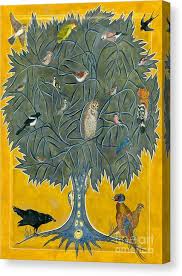 And yet, despite this abnormal growth we must remember that what our Lord planted was his seed, and the mustard seed is still present, even though it is obscured and difficult to see behind the towering pride and elevated position of much of the great tree. Finally, what is the significance of the birds which come and make their nests in the branches? We do not have to look very far for the understanding of that. Right in this very series of parables our Lord tells us what the birds mean. In the first parable he said that when the seed of the word falls upon a hardened human heart, the birds come and snatch it away. And in his interpretation he said that the birds represented the evil one, the enemy, whose evil powers and forces are at work upon men's lives.
And yet, despite this abnormal growth we must remember that what our Lord planted was his seed, and the mustard seed is still present, even though it is obscured and difficult to see behind the towering pride and elevated position of much of the great tree. Finally, what is the significance of the birds which come and make their nests in the branches? We do not have to look very far for the understanding of that. Right in this very series of parables our Lord tells us what the birds mean. In the first parable he said that when the seed of the word falls upon a hardened human heart, the birds come and snatch it away. And in his interpretation he said that the birds represented the evil one, the enemy, whose evil powers and forces are at work upon men's lives.
If the Lord had not said that we might not have read this in that way. There is an interpretation of this parable which says that this is a picture of the gospel going out to all the world and growing up into an impressive church, and that the birds are song birds -- robins and bluebirds and others which come and make their nests -- and are symbols of beautiful things which happen in the church. But that would be exactly opposite the way our Lord uses them. These are not song birds; they are vultures and buzzards, birds of prey, apt symbols of evil persons and evil ideas which make their home right in God's church.
This is confirmed in the book of Revelation. The false church is symbolized there by the great harlot and the city called "Mystery Babylon the Great," (Revelation 17:5). When it is overthrown an angel announces that "Babylon the Great is fallen, is fallen, and has become the habitation of demons, and the hold of every foul spirit, and a cage of every unclean and hateful bird," (Revelation 18:2).
You notice that it is only since the tree is fully grown and has branched out that this has taken place. It is as we near the end of the age this has occurred. How visibly this has been demonstrated in our day when from the pulpits and the spokesmen of the church has come a flood of stupid, crazy, mixed-up ideas -- evil concepts which have blasted and blighted and ruined the hearts and minds of people, just as our Lord said. It was only a comparatively short time ago that the great denominations of our day, though they represented unnatural and abnormal development, still were basically true to the faith and stood solidly on the authority of the Bible and proclaimed a true gospel. But then along came German rationalization and higher critical theories and socialistic philosophies. The Bible was overthrown and another gospel was substituted and supernatural faith was denied, and the birds of prey moved right into the pulpits in many places. One by one men of true faith were driven out. And it is still happening today. No wonder that when the youth of today look at the part of the church which is like that they say, "It is strictly for the birds!"
But what a comfort it is that our Lord had no delusions about this age! How clearly he foresaw all that has happened. How precisely he unfolds it to us here, that we might not be deluded either. How shall we apply this to our lives? Well, obviously it is important that we retain the nature of the mustard seed, that we be fiery and active and pungent and burning, without doing anything to abet the unnatural growth of this mustard tree. We are to seek to be low-profile wherever we work, not calling attention to ourselves, not seeking to publicize and aggrandize ourselves but to open our hearts unto God and let him take care of the rest.
We are to permit nothing in our own individual lives of loftiness and pride and ambition and desire for prominence and power and position within the church. We must not struggle and be rivals to one another. Where that is evidenced it always means that people do not yet understand how the church operates because there is no rivalry in the church of Jesus Christ. Everyone has his own gift and his own ministry, and, in fulfilling it, he is always to work in cooperation with everyone else. We are called to have faith like a grain of mustard seed, our Lord said in another place, that will grow and increase in pungency and power and impact until it completely stirs up a community, arouses it, awakens it, makes it realize what is happening, and heals it.
One of these days, the Scripture says, our Lord is going to say to this great, ungainly tree, this unnatural growth, "Be thou rooted up and cast into the midst of the sea" (Matthew 21:21), and it shall be done... The Case of the Ambitious Seed, --Ray C. Stedman (1971)
Isaiah the prophet had startling words of promise to any and all who were drawn to serve the God of Israel. They were foreigners (group one) or eunuchs (group two). The latter class included any and all single persons who were drawn to serve Jesus in a world where heterosexual marriage was the norm. Here are those timeless promises from Isaiah:
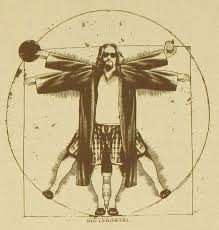
![]()
 This article is about trees as a symbol of man in the Bible. Symbols like this are scattered through the Bible. The meaning of a certain symbol does not change from Genesis to Revelation. The first appearance of a subject in the Bible may indicate what is called a type.
This article is about trees as a symbol of man in the Bible. Symbols like this are scattered through the Bible. The meaning of a certain symbol does not change from Genesis to Revelation. The first appearance of a subject in the Bible may indicate what is called a type. 
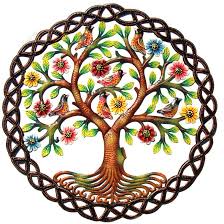

 And yet, despite this abnormal growth we must remember that what our Lord planted was his seed, and the mustard seed is still present, even though it is obscured and difficult to see behind the towering pride and elevated position of much of the great tree. Finally, what is the significance of the birds which come and make their nests in the branches? We do not have to look very far for the understanding of that. Right in this very series of parables our Lord tells us what the birds mean. In the first parable he said that when the seed of the word falls upon a hardened human heart, the birds come and snatch it away. And in his interpretation he said that the birds represented the evil one, the enemy, whose evil powers and forces are at work upon men's lives.
And yet, despite this abnormal growth we must remember that what our Lord planted was his seed, and the mustard seed is still present, even though it is obscured and difficult to see behind the towering pride and elevated position of much of the great tree. Finally, what is the significance of the birds which come and make their nests in the branches? We do not have to look very far for the understanding of that. Right in this very series of parables our Lord tells us what the birds mean. In the first parable he said that when the seed of the word falls upon a hardened human heart, the birds come and snatch it away. And in his interpretation he said that the birds represented the evil one, the enemy, whose evil powers and forces are at work upon men's lives.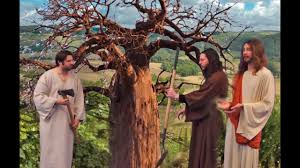
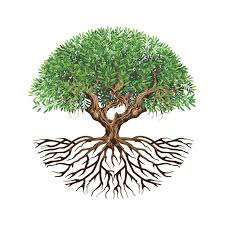 The Gardner in Luke 13 asks permission to dig around the roots of the tree (and to fertilize it with dung) for a second chance at fruit bearing. A reprieve is given for a season but if it bears no fruit, the Gardner, may cut it down. Do we not as Christians need God to break us loose from our comfort zone? We can not on our own bear any fruit of lasting value! Real life is Christ Jesus living His endless life through us. He can't do this without our permission. Second Peter shows us eight steps to knowing God and bearing fruit throughout a life time.
The Gardner in Luke 13 asks permission to dig around the roots of the tree (and to fertilize it with dung) for a second chance at fruit bearing. A reprieve is given for a season but if it bears no fruit, the Gardner, may cut it down. Do we not as Christians need God to break us loose from our comfort zone? We can not on our own bear any fruit of lasting value! Real life is Christ Jesus living His endless life through us. He can't do this without our permission. Second Peter shows us eight steps to knowing God and bearing fruit throughout a life time.


